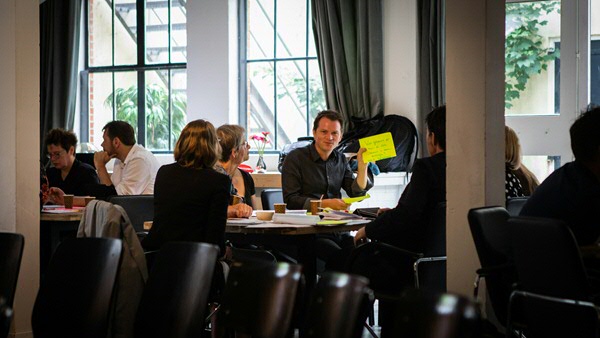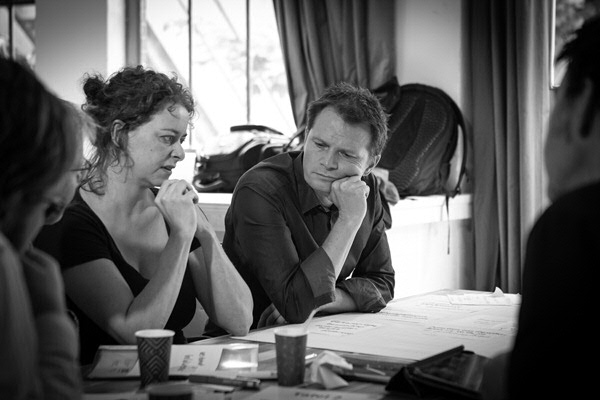Knowledge as a foundation

How can academia help when the credibility of the world dissolves before your very eyes? When you no longer feel at home in your own province, in a house that has been deemed unsafe? How much is knowledge worth in a situation like this? Knowledge won't win the war. But it doesn't have to, claims Tom Postmes. What it does have to do is to make sure that everything is clear and to ask the right questions. We talked to the professor of Social Psychology about how he thinks academia can help in a complex situation like the Groningen earthquake problem.
Text: Elske Kroondijk, Communication UG / Photos: Reyer Boxem en Angelo Roga
Obviously, Tom Postmes sometimes feels disheartened. His research into the social impact of the earthquakes in Groningen has brought home to him just how powerless residents feel. ‘Why are we even here?’ was one of the questions heard at the last Knowledge Table session; a series of sessions organized by the Liveable and Promising Groningen Knowledge Platform which was established at the request of the National Coordinator Groningen (NCG). By setting up the platform – a collaboration between the UG (the coordinator), Hanze University of Applied Sciences, CMO STAMM/Groningen Social and Cultural Planning Office and the Groningen local health authority – the NCG aims to pool as much knowledge as possible and to stimulate the understanding of knowledge.
Do we need yet another platform?That's a good question. We don't want to be the next in a long line of organizations that are getting people's hopes up. We must avoid this at all costs. So, our very first task was to work out whether we should start up at all. What we don't want to do is to conduct our own research and pretend that we have all the answers. Instead, our aim is to pool existing knowledge and then try to interpret and explain it. This will allow us to help researchers to formulate good research questions, and to help parties such as the NCG, government and local residents in the search for solutions.
What is the added value of a knowledge platform like this?The earthquake problem is a highly complex legal and administrative tangle. There is a lot of distrust, unrest and stress. The area's heritage and identity are at stake. There are economic set-backs as well as opportunities. All of these issues are intertwined. Bringing researchers and professionals from various fields together and allowing them to engage with the residents puts everyone in a position to learn. It also helps researchers to formulate sharper research questions – questions that may otherwise never have occurred to them.
In other words, the added value of collaboration.Yes! I believe in joining forces, pooling resources. Some professionals and researchers prefer to zoom in on one very specific aspect of the situation in Groningen, in isolation from everything else that is going on. But you can’t help thinking that there has to be a better way. For example, I might read an article in an academic journal and think that these researchers haven’t got the faintest idea what's actually going on here in Groningen. Articles of this kind are incomplete and sometimes even incorrect. You can prevent this by collaborating with others in the field.
In concrete terms, what can a platform like this actually do for the aggrieved parties in Groningen?We don't represent the psychosocial care sector or legal aid departments, so we're not here to offer people any form of direct help. But I've noticed that residents and professionals appreciate proper knowledge, clarity and insight on the subject. That is what they really want. We also saw this during the master classes we organized: they were packed. The audiences were very diverse, including local civil servants and people working for organizations or companies concerned with the issue, as well as residents. They were all desperate for knowledge. Not debate, not discussions – just knowledge.
Where do you think this thirst for knowledge comes from?I think that people need clarity, particularly at a time when so much is uncertain and unclear. Luckily, there's already lots of knowledge available. This was one of the conclusions of the Knowledge Table session: people were amazed at how much information already exists. There is an overwhelming feeling that based on this knowledge, we already know how we should proceed with particular cases. But it's paradoxical: although we are steadily building our body of knowledge about the earthquake problems, at the same time, uncertainty is still growing. It's a strange contradiction.
It's a bitter pill to swallow. All that knowledge gives people hope, but the idea that it's not being put to good use is depressing.If we can use these Knowledge Table sessions to reach a consensus about what we know and how to proceed between the people on the academic side, the people on the practical side and those working with the residents, then I don't see much to be depressed about. I really admire the researchers who say, 'the knowledge is out there, you don't need me anymore'. This means that we can stop talking and actually get some work done on certain tasks.

No, I definitely think that academia should help to find and implement solutions. That is one of the objectives of the knowledge platform. This is how I’d put it: How can you organize the total package of responsibility, commitment and finance in a way that enables you to work out a joint strategy? Knowledge and academia play a very important role in this part; the governance issue. But this is exactly where it becomes most complicated and sensitive.
At present, the only way forward is through the courts...Yes. But this causes unease and alienation. People are feeling increasingly alienated from their own country and from society. This is both painful and true. I sound like a politician: ‘This is both painful and true, and we must all do something to remedy it.’ But this is where the researcher's responsibility stops. It simply isn't the job of a knowledge platform to ‘do something to remedy it’. But what we can do is say that we don't understand. And we can say that this isn't right. And that there is another way.
So, what exactly is the point of research?Academic knowledge can be used to define and clarify existing situations. It can be used to explain what is and isn't desirable. Or, you can do international and historical comparative studies, asking the question: are there any successful alternatives out there? This will provide a starting point. Judges, for example, use our research to reach their rulings. And the State Supervision of Mines (SodM) quoted a literature review by the knowledge platform as a reason for reducing the gas extraction. I wouldn't want to narrow our task down to letting researchers decide what does and doesn't need doing. It would be dreadful if this was how people viewed researchers. It would basically dispense with the need for democracy and normal social interaction. And that's not the way forward, is it?
You need to cherish the autonomous position of academia.You do, but you mustn't exaggerate that autonomy. It’s easy to translate the idea of academic autonomy into leaving researchers to get on with it and allowing them to take no notice of society. But I don't agree. Our aim is to shed as much light as possible on a problem that is affecting society, and examine ideas about alternative strategies from the normative angle. The only way to do this is by engaging residents and other relevant parties in dialogue, and ensuring that the knowledge doesn't become disconnected from reality. But I draw the line at the suggestion you seem to be making that researchers should come up with solutions. I'm fine with formulating recommendations and suggesting solutions, but making policy and taking responsibility for its implementation it isn't a job for researchers – we have administrators and professionals for that.

There are all sorts of modern constructions for this. We call it co-creation now, but it basically means joining forces. Researchers can play a productive part in this respect. There are countless national and international examples of situations where this works very well. The problem with the situation in Groningen is that it's all so incredibly political and distrust plays a major role. As a researcher, you have to be aware of who you are working with, who is footing the bill and the conditions on which you accept funding. Transparency is much more important here than in other areas. This puts collaboration and co-creation under a certain amount of pressure.
How do you stay positive if this is the reality? I'm asking you this as a researcher.It's always a latent risk. You're setting up a knowledge platform at a time when no-one knows what will happen next. To be honest, this is sometimes a problem for my own research, too. We keep approaching residents and organizations with the same question: will you think alongside us again? We only do this because we think that we can do something positive for them too. I can assure you that, if I ever have the feeling that I can't do it again, I'll stop asking them. In the questionnaires that we send to residents, we often read: 'Great that you're doing this. Keep going!' But we also read: 'I hope that someone will eventually do something with the results.'
If not solutions, what does knowledge have to offer? Comfort?The parents of a missing child can still experience closure, even if they must wait twenty years to find out what happened. Clarity, certainty and insight: these are hugely important to everyone. You want to understand. A lot of people struggle with not knowing, not understanding why things are as they are. 'People are quick to say that knowledge isn't a goal in itself. But when you find yourself in a precarious situation, knowledge can become a goal in itself. This is because wanting to understand how things work is a basic human function.
What do you consider to be the most important contribution that academia can make to societal issues such as Groningen's earthquake problem?Research has played a part in fuelling social debate. In other words, in forming public opinion and in the questions being asked in the Dutch House of Representatives and in the courts. Academia has helped to launch questions that make a difference. There may not be a tailor-made solution, but academia helps to ensure that debate is heard in places that matter, that are beneficial, and which give other people the chance to come up with solutions. Valuable research isn't the research that provides the most obvious results; it's the research that elicits more questions and gets people thinking.
| Last modified: | 12 March 2020 9.23 p.m. |
More news
-
17 March 2025
Liekuut | The high price of conflicts
According to Carsten de Dreu, Professor of Foundations of Cooperation and Social Organization at the University of Groningen, a lot can be learned from conflicts.
-
10 March 2025
Science for Society | Memory Lab for higher marks
Learning facts at school is something hardly anyone likes. The day before a test, pupils cram as many words or names as possible into their heads, only to hopefully remember them the next morning and then forget them again after the test.
-
05 March 2025
Women in Science
The UG celebrates International Women’s Day with a special photo series: Women in Science.
